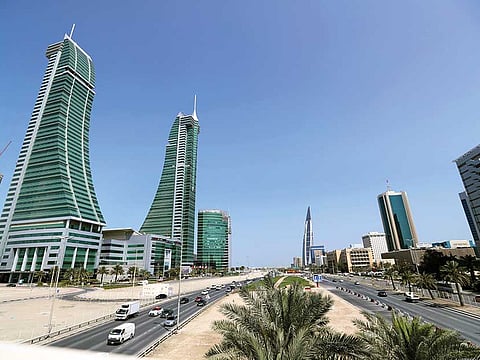Bahrain says Gulf allies to boost financial support
Investor confidence has been hit by the kingdom’s difficulties in finding new creditors to finance its large budget deficit

Dubai: Bahrain said Wednesday that its Gulf allies are to unveil a new support package to shore up its finances, which have been strained by seven years of persistent civil unrest.
The kingdom’s central bank intervened on Tuesday to defend the value of the dinar, promising to maintain its peg to the dollar against pressure on spot markets, London-based Capital Economics said.
Investor confidence has been hit by the kingdom’s difficulties in finding new creditors to finance its large budget deficit.
A credibly large policy package — comprising both revenue and expenditure measures ... is urgently needed.”
“The Kingdom of Bahrain along with its sisters Saudi Arabia, the UAE and Kuwait will announce a programme to support the stability of the financial situation in Bahrain,” Finance Minister Shaikh Ahmad Bin Mohammad Al Khalifa told the official BNA news agency.
Sheikh Ahmed gave no time frame for the new cash injection. Bahrain’s wealthy neighbours are still disbursing $10 billion (Dh36.7 billion) in financial support they pledged to Bahrain in 2016.
The Gulf states sent police and troops to the kingdom in 2011 to help its Sunni rulers to crush monthlong protests led by its Shiite majority for a constitutional monarchy with an elected prime minister.
The ruling Al-Khalifa family has since outlawed the main opposition groups and jailed dozens of their leaders, but sporadic unrest has continued, sapping the economy.
IMF report
Even before the oil price collapse of 2014, Bahrain was running up large annual budget deficits, swelling the national debt to around $31 billion, or 89 per cent of gross domestic product, the International Monetary Fund said in a March report.
The kingdom posted a deficit of close to $5 billion last year and is projecting a shortfall of $3.5 billion in 2018.
Bahrain is currently a minor oil producer with output of some 200,000 barrels per day. But in April it announced the discovery of more than 80 billion barrels of shale oil which it hopes to start pumping in 2023 in a major fillip for public finances.
In the meantime, the IMF has called on the authorities to tighten their belt by cutting subsidies and introducing new taxes, something they have been loath to do for fear of fanning unrest in the Gulf’s poorest economy.
“A credibly large policy package — comprising both revenue and expenditure measures, while protecting the most vulnerable — is urgently needed,” the IMF said in its March report.
Sign up for the Daily Briefing
Get the latest news and updates straight to your inbox



